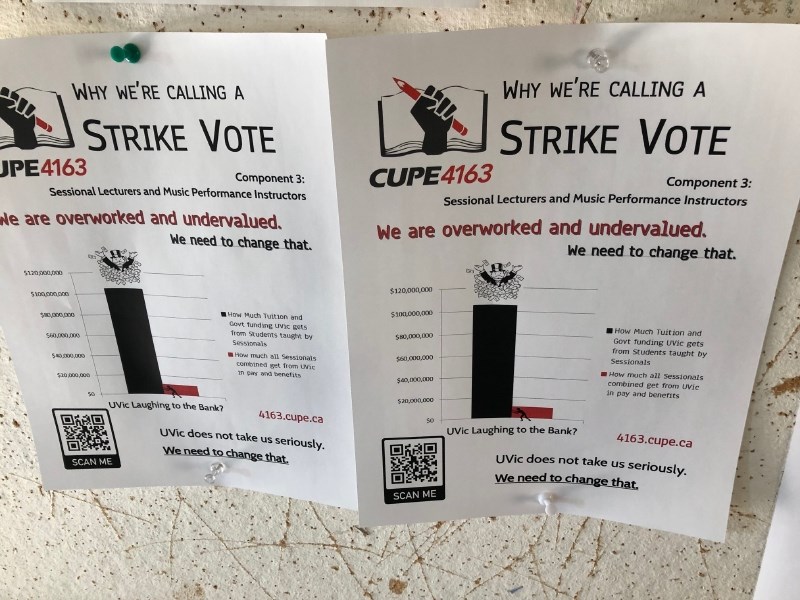Sessional lecturers and music instructors have reached an impasse in contract talks with the University of Victoria, their union says.
Greg Melnechuk, president of CUPE 4163, said negotiations ground to a halt Thursday after five months of bargaining.
“While the university acknowledges that the sessional lecturers do 30 per cent of the teaching at UVic, they still refuse to treat this overworked and underpaid group of educators with the respect they deserve,” he said.
The sessional lecturers and music performance instructors in CUPE 4163’s Component 3 recently voted in favour of strike action — the first such vote in the component’s 20-year history, the union says.
“The employer made a bit of movement in response to our unprecedented strike vote, but they came nowhere near close to addressing our very real needs around job security,” Melnechuk said.
Kane Kilbey, UVic’s associate vice-president of human resources, said the university remains committed to reaching a collective agreement as quickly as possible.
“While we are disappointed that the union’s negotiating team rejected the university’s settlement offer and also declined to table a counter proposal, we are hopeful that any possible job action by the union can be avoided,” he said in a statement. “There are only a few issues left to resolve.”
Both the union and the university are going to the Labour Relations Board in an effort to settle the dispute.
The university said it has asked the board to appoint a mediator “to assist the parties to reach agreement on those last few issues.”
The union said it has contacted the B.C. Labour Relations Board to initiate discussions about essential services in the event of a strike.
“We don’t anticipate that the process should take too long,” Melnechuk said. “We’ll be meeting with our members next week to discuss types of job action they wish to take and the timing of any job action.”
The university’s website notes that the Labour Relations Board has to issue an essential services order before any job action begins.
“The essential services designation process can take several weeks and first involves discussions between the university and all of its unions, and then if necessary, the assistance of the [board] to mediate or adjudicate essential services and staffing levels,” the university says.
The union has said its main goal is to improve job security for its members, many of whom have no idea whether they will have a job the following year.
The instructors also want pay increases in line with the province’s public sector bargaining mandate of two per cent hikes in each year of a three-year deal.
The union says an instructor in the middle of the salary scale makes about $48,000 a year for teaching a total of eight courses — four in the winter semester and four in the spring.
Melnechuk said few instructors, however, get that many courses, which is one of the reasons the union is seeking improved job security.
In addition, there is no guarantee how many students an instructor will be required to teach, he said. “One of our sessional instructors was recently told that his course this year would be increasing from 80 to 150 students.”
The previous contract expired April 30.



